When Taiwanese academic Shih Cheng-feng (施正鋒) was a boy, he was forced to speak a language that was not his own, and four decades later he still feels handicapped by his education.
He grew up under a regime that had fled China and now wanted him and everyone else to speak the dominant language of the mainland, with the right Beijing accent.
This included a difficult sound not common on the island that involves rolling up the tongue, and students who lapsed into their native Taiwanese were humiliated with a tag saying: “I’m no good. I speak dialect.”
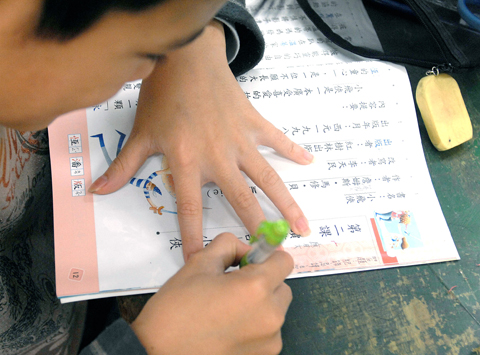
PHOTO: PATRICK LIN, AFP
“Sometimes people have only developed their Taiwanese to elementary-school level,” said Shih, now a 52-year-old political scientist at National Dong Hwa University in Hualien.
“They don’t know the academic terms, even if they want to use them … We lost values, traditional wisdom, everything,” he said.
Millions of Taiwanese have the same experience as Shih, meaning that the country today is left with a complex linguistic legacy that determines its fate in numerous ways — but has also meant some advantages.
The ability to speak Mandarin means Taiwanese can, without difficulty, communicate with all 1.3 billion people in China, taking advantage of the startling economic boom over the past three decades.
“Taiwanese can do business much more easily than Hong Kong people because Chinese find it’s much easier to communicate with [Taiwanese],” said Wang Horng-luen (汪宏倫), a sociologist at Academia Sinica.
The Cantonese language is dominant in Hong Kong.
“Many Chinese people say Taiwanese people speak Chinese even better than they do themselves. There are many dialects in China, so many people speak Mandarin, but do it with a very strong accent,” he said.
Language may have been the single most important factor in allowing Taiwan to latch onto the Chinese juggernaut, with Taiwanese investors placing more than US$100 billion in China.
However, this has come at a steep cost, as many of Taiwan’s 23 million people have limited ability to speak the languages native to Taiwan for centuries.
At home, most speak Hoklo (also known as Taiwanese), which came to Taiwan with immigrants from China as long as 300 years ago.
Millions of others speak Hakka, another language imported from China, or one of numerous Austronesian languages that have nothing to do with Chinese.
“The justification for imposing Mandarin was to unify people with the same language, but there was a hidden agenda,” Shih said.
“If you want to crush people, you should deprive them of their history, their culture, their language,” Shih said.
The Chinese Nationalist Party (KMT) took over Taiwan from a defeated Japan in 1945, immediately striving to revive a Chinese consciousness among locals who had been under Japanese colonial rule for 50 years.
Although there might have been an economic rationale for teaching Mandarin in Taiwan, the main aim was political, said Jennifer Wei (魏美瑤), an academic at Soochow University in Taipei.
“The high-handed language policy in the 1950s and 1960s was not all for economic development, but had to do with the all encompassing efforts to keep a tight control of the people,” she said.
“If the Nationalists only had the economic development in mind, then they shouldn’t ban the use of Japanese,” Wei said.
Bruce Jacobs, a specialist on Taiwan at Australia’s Monash University, remembers visiting a local dissident’s house with a friend around 1980 and trying to speak to the dissident’s daughter in Taiwanese.
“My friend said she can’t speak it. At that time very educated parents would speak Mandarin at home. She was 11 at the time,” he said.
“Just like the British in India and the French in Algeria, the Nationalists pushed the colonial language,” he said.
Paradoxically, given the KMT government’s original aims, the Mandarin now in use in Taiwan may actually contribute to developing a special identity in the country.
This is because Taiwanese have no common language other than the Mandarin they all learned at school, Wang said.
“The Mandarin spoken and written in Taiwan is very different from the Mandarin in use in mainland China,” he said.
“When Taiwanese people nowadays try to distinguish themselves from people from the mainland, language serves as a cultural marker,” Wang said.
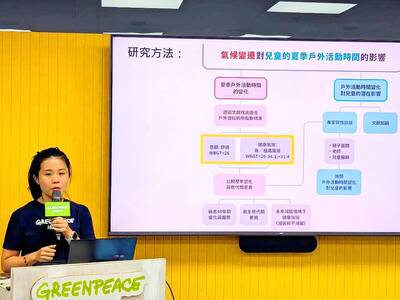
The government should improve children’s outdoor spaces and accelerate carbon reduction programs, as the risk of heat-related injury due to high summer temperatures rises each year, Greenpeace told a news conference yesterday. Greenpeace examined summer temperatures in Taipei, New Taipei City, Taoyuan, Hsinchu City, Taichung, Tainan and Kaohsiung to determine the effects of high temperatures and climate change on children’s outdoor activities, citing data garnered by China Medical University, which defines a wet-bulb globe temperature (WBGT) of 29°C or higher as posing the risk of heat-related injury. According to the Central Weather Administration, WBGT, commonly referred to as the heat index, estimates
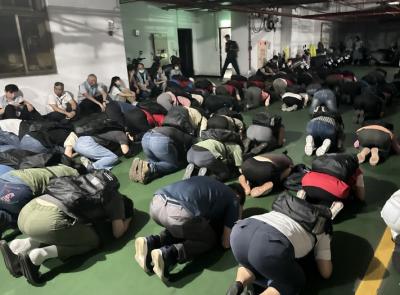
Taipei and other northern cities are to host air-raid drills from 1:30pm to 2pm tomorrow as part of urban resilience drills held alongside the Han Kuang exercises, Taiwan’s largest annual military exercises. Taipei, New Taipei City, Keelung, Taoyuan, Yilan County, Hsinchu City and Hsinchu County are to hold the annual Wanan air defense exercise tomorrow, following similar drills held in central and southern Taiwan yesterday and today respectively. The Taipei Mass Rapid Transit (MRT) and Maokong Gondola are to run as usual, although stations and passenger parking lots would have an “entry only, no exit” policy once air raid sirens sound, Taipei
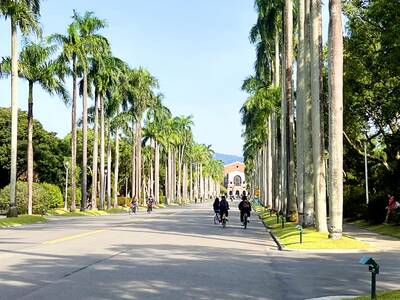
Taipei placed 14th in the Quacquarelli Symonds (QS) Best Student Cities 2026 list, its highest ever, according to results released yesterday. With an overall score of 89.1, the city climbed 12 places from the previous year, surpassing its previous best ranking of 17th in 2019. Taipei is “one of Asia’s leading higher-education hubs,” with strong employer activity scores and students “enjoying their experience of the city and often keen to stay after graduation,” a QS staff writer said. In addition to Taipei, Hsinchu (71st), Tainan (92nd), Taichung (113th) and Taoyuan (130th) also made QS’ list of the top 150 student cities. Hsinchu showed the
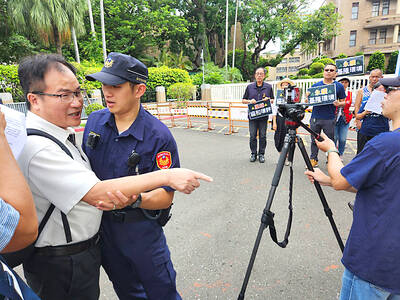
Environmental groups yesterday filed an appeal with the Executive Yuan, seeking to revoke the environmental impact assessment (EIA) conditionally approved in February for the Hsieh-ho Power Plant’s planned fourth liquefied natural gas (LNG) receiving station off the coast of Keelung. The appeal was filed jointly by the Protect Waimushan Seashore Action Group, the Wild at Heart Legal Defense Association and the Keelung City Taiwan Head Cultural Association, which together held a news conference outside the Executive Yuan in Taipei. Explaining the reasons for the appeal, Wang Hsing-chih (王醒之) of the Protect Waimushan Seashore Action Group said that the EIA failed to address